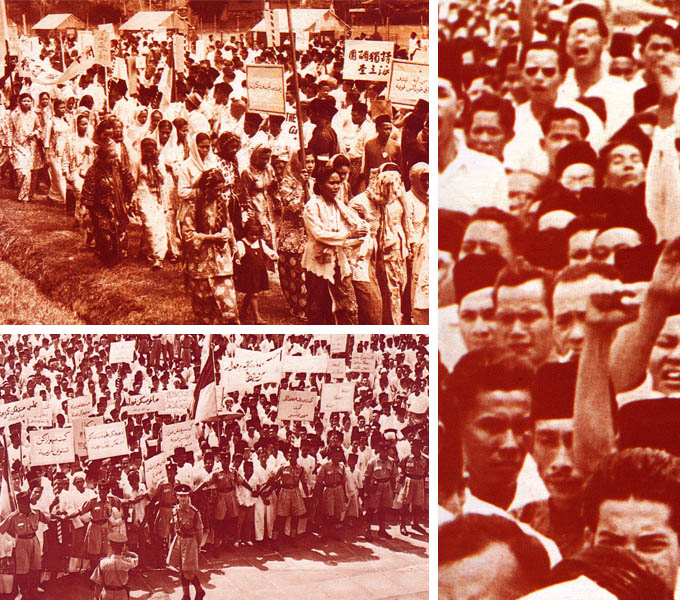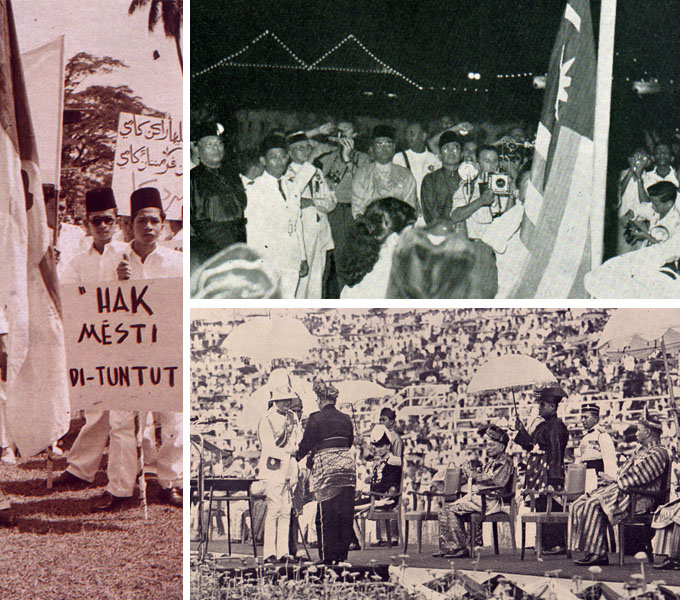HISTORY OF STRUGGLE
Today, UMNO is recognised as the largest party which used to form the pillar of the Federal administration, with the most seats and representatives at the policy-making steering.
As the most democratic and the oldest among developing nations, it is still a premier party and remains solid although it was faced with many challenges. Its principle for justice and policy of engagement are well-recognised and respected by many.
In confronting the Malayan Union waged by the British after the Second World War, these organisations have voluntarily dissolved themselves to pave ways for the founding of a single Malay party that will look after and champion their rights based on unison.
Under the British, all pro-Malay policy enacted before the WWII would be revised, hence forcing the Malays who were the indigenous people of the country to compete openly with the migrants. This was beyond their hope and expectation as under the previous British agreement they would be protected from the migrants’ threats, and an assurance that Malaya was a Malay country to be rule by the Malay Rulers.
The Malayan Union plan which was forced on them without any consultation came as a shock. If the Malays were fractionalised over local and regional sentiments, they now began to realise the situation, thus agreed to unite against Malayan Union. Their rise was a spontaneous action that motivated uniformity in fighting for their own cause.
The foundation of UMNO on May 11 1946 with Dato’ Onn Jaafar as its first leader was deemed as a catalyst to bring the Malays together in their quest for rights in politics and economy which began to elude them and instead benefitted the migrants.
Malay nationalism was at its low then due to many factors, among which were the multilateral society, oppression by the colonial power, the tendency of Malay to breakup, no political conscience and the economical ambience which satisfied them to live moderately.

The new spirit of nationalism was needed to safeguard the harmonic living of the indigenous or the original people of the country. Hence, any future planning or direction for the country will have to take into account all aspects of the Malays.
It was not a narrowed down nationalism as it had a far-reaching idealism to include the importance of building a multiracial country with integrated elements of unity and stability. At the infancy of its struggle for Independence, UMNO realised that no force must be imposed on others and their rights to domestic politics will be recognised. Efforts were made to form a multiracial political pact when Perikatan between UMNO-MCA was finally established in 1952 when both parties contested in Kuala Lumpur municipal elections. Their victory paved the way for Independence.
In preparing for the first general election in 1955, UMNO-MCA-MIC pact was inked to symbolise the multiracial cooperation. At the stewardship of Tunku Abdul Rahman Putra, Perikatan won with flying colours. This was a clear message to the colonial British that all races in Tanah Melayu came as one and were ready for Independence.
Before 1957 Independence, some basic issues were discussed by UMNO, MCA and MIC leaders, notably the constitutional rights of each and every race in the country. Some priorities given to the Malays were also accorded to the non-Malays, especially for those who were born and had lived here. The non-Malays were given rights to move freely when full citizenship was awarded to them. In return, the Malays were given special place to the economic activities and education. Bahasa Melayu was constitutionalised as the official language and Islam as the official religion.
This has mooted a concerted effort by all races to work towards unification for Independence and nation-building. It went on until the eve of 1969 general election when certain quarters incited racial hatred which led to communal aggression. Not long after, the cooperation was fortified again with a clause that the rights of every race must not be questioned again under the amended Constitution. Other steps were also taken as measures to ensure racial integration under common rule.
The three-race concept under Perikatan saw the birth of Barisan Nasional in 1974, which was later on comprised of 13 parties representing all races and ethnics in Malaysia. Together, they vowed to keep unity at bay and made Malaysia a progressive nation under a Constitution that uphold Islam as the official religion while other faiths are free to be practised in any states in the Federation, upholding the principles of Rukun Negara dam work commonly for just of all.

OBJECTIVES
Since UMNO inception, its objectives remain the same although some minor amendments were made to its Constitution. It is clearly explained under Clause 3 of UMNO Constitution, as follows:
UMNO is a party upholding the Malay nationalism in the name of their dignity, religion and nation.
- Defending the country’s Independence and sovereignty.
- Upholding and defending the Federal and States Constitutions, and Constitutional Monarchy.
- Uphold, defend and promote Islam as the official religion dan recognise the rights of other faiths.
- Defending the sovereignty rights and social justice of the people under Parliamentary Democracy and to steer the Malay/Bumiputra and Malaysians economic status.
- Protecting Bahasa Kebangsaan (Bahasa Melayu) as the official language.
- Bridging interracial cooperation in making Malaysians standing tall by virtue of human rights and Special Rights of the Malays and Bumiputras.
Based on these objectives, UMNO members must stand united irrespective of personal interest and difference of opinion. United is translated into uniformity in steering the party on common ground. UMNO leaders and members will not stray from the objectives because it was stipulated to be the thrust of the Malays.
STRUCTURE AND ORGANISATION
Democratically, grassroot members hold the power in voicing out their needs and opinions at the Branch and Divisional meetings, or even the General Assembly (national level).
The annual General Assembly is the highest order which converge delegates from each and every division. The delegate conference will discuss and elaborate all achievements and issues as guidelines to improve future planning and steps to be taken as to enhance the party. Leaders at all levels will be appointed in a party election to be held every three years. This includes the election of the Supreme Council members, an important core where the future and progress of the party lies.
The Supreme Council looks after the party’s political policies, economy, education, culture and welfare of the people to be tabled at the General Assembly for vetting before it is approved by delegates. As the highest authority, the Council also acts as a monitoring body to ensure that the government implement it.
It also decides on the right candidates for general election and by-elections, and in choosing the right delegation for certain meetings and other events.
UMNO today enters a transformation era in party elections process by abolishing the quota system and replaced by a more open procedure which gives the grassroot members more space to choose leaders at national and state levels.
States Liasion Committee acts as the ‘liasion’ or arbitrator for matters between Divisions and Central. It will administer all party matters within the respective states and putting them to order. However, the State Liasion must get prior approval from the Supreme Council since the appointment of its chairman and deputy are the prerogative rights of the party President on consent of the Supreme Council members.
States Liasion committee also will govern meetings at branch and divisional in respective states. All issues will be dissolved locally unless it needs attention or solution at national level.
As at now, UMNO has 191 divisions which represent electoral seats in the Peninsular and Sabah. Progress of each and every division hingers on annual delegate conference. Among responsibilities of elected delegates is to identify issue to the General Assembly. They will also weigh proposals by Divisional Committee and making fresh recommendations. Divisional Committee member are to be chosen once in every three years.
A branch is the smallest unit in the party. This is where the grassroot member which from the strength of the party, are. There are 21,000 branches at present in the Peninsular and Sabah with an estimated 3.6 million members. Branch Committee members are also chosen every three years, and among their duties are to ensure that members are loyal to the party and leaders, instil camaraderie spirit and cooperate in any form.
MEET OUR LEGISLATIVE
Our Elected
Representatives
Lorem ipsum dolor sit amet, consectetur adipisicing elit, sed do eiusmod tempor incididunt ut labore et dolore magna aliqua. Ut enim ad minim veniam, quis nostrud exercitation ullamco laboris nisi ut aliquip








